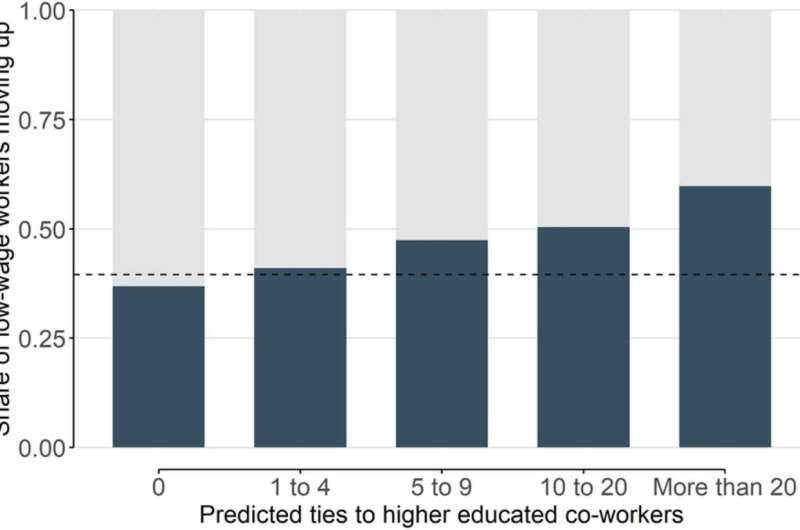Social ties can increase salary for low-wage workers

Low-wage jobs—when are they stepping-stones towards a successful career and when do they become traps? A new study from Umeå University investigated when transitions from low-wage to better-paid jobs are more likely, and what role having highly educated colleagues may play in that process.
"In our paper, we wanted to identify workplace-specific social environments that foster transitions from low-wage to better-paid employment," says Anna Baranowska-Rataj, associate professor at the Department of Sociology and the Center for Demographic and Aging Research at Umeå University. "Therefore, we examined what effect social ties to higher educated co-workers had on the upward pay mobility for workers who started their careers in low-earnings jobs."
Learning from colleagues
The researchers used matched employer-employee data from Swedish registers that combined education registers, income tax registers, and social security registers. With the help of personal identity numbers and firm identity numbers they could link individuals with their employers within and across registers.
Using innovative methods for prediction of social ties among co-workers, they were also able to estimate the numbers of social ties that low-wage workers have established at their workplaces. Then, the researchers assessed if social ties to higher educated co-workers could be helpful for upward wage mobility of low wage workers.
"Our analysis shows that the likelihood of moving to a better-paid job within a year is higher among the low-wage workers with a higher number of social ties to higher educated workers," says Zoltán Elekes, research fellow at the Center for Regional Science (CERUM) at Umeå University.
"We could imagine a survey interviewer at a market research company—a typical low wage job. Even though his/her duties are relatively simple, she/he might interact with other workers at the firm quite often, especially with people who design market research surveys. This because market research companies train interviewers basically each time they start a new survey. This interaction could potentially lead to learning processes that subsequently facilitate a upward career move."
The results confirm that having social ties to higher-educated co-workers increases individual chances of transitioning to better-paid employment.
"A workplace with more opportunities for forming social ties to higher-educated co-workers raises the likelihood of upward wage mobility," Zoltán Elekes continues. "These effects do not vanish even after we controlled for unobserved differences between workers. Hence, the degree to which a low-wage job becomes a 'stepping-stone' or a 'dead-end' for a young worker, depends on the skill composition at the firm where this job is located, and the opportunities to establish social ties with higher educated co-workers."
Education beneficial for all
The study highlights that education attainment should not be seen a private investment which brings benefits only to those who receive it. Rikard Eriksson, professor at CERUM and the Department of Geography, Umeå university, says that given that the knowledge spillovers at workplaces seem to also benefit the least advantaged groups of workers, education attainment should be regarded as a collective resource, and an important dimension of social policy.
"We argue that when governments plan active labor market policies (ALMP) such as on-the-job training in companies, they should pay attention to which types of companies get funds for offering training—are these environments where participants of ALMP get chances to make contacts with someone from whom they can learn new things," says Eriksson.
The work is published in the journal Research in Social Stratification and Mobility.
More information: Anna Baranowska-Rataj et al, Escaping from low-wage employment: The role of co-worker networks, Research in Social Stratification and Mobility (2022). DOI: 10.1016/j.rssm.2022.100747
Provided by Umea University




















